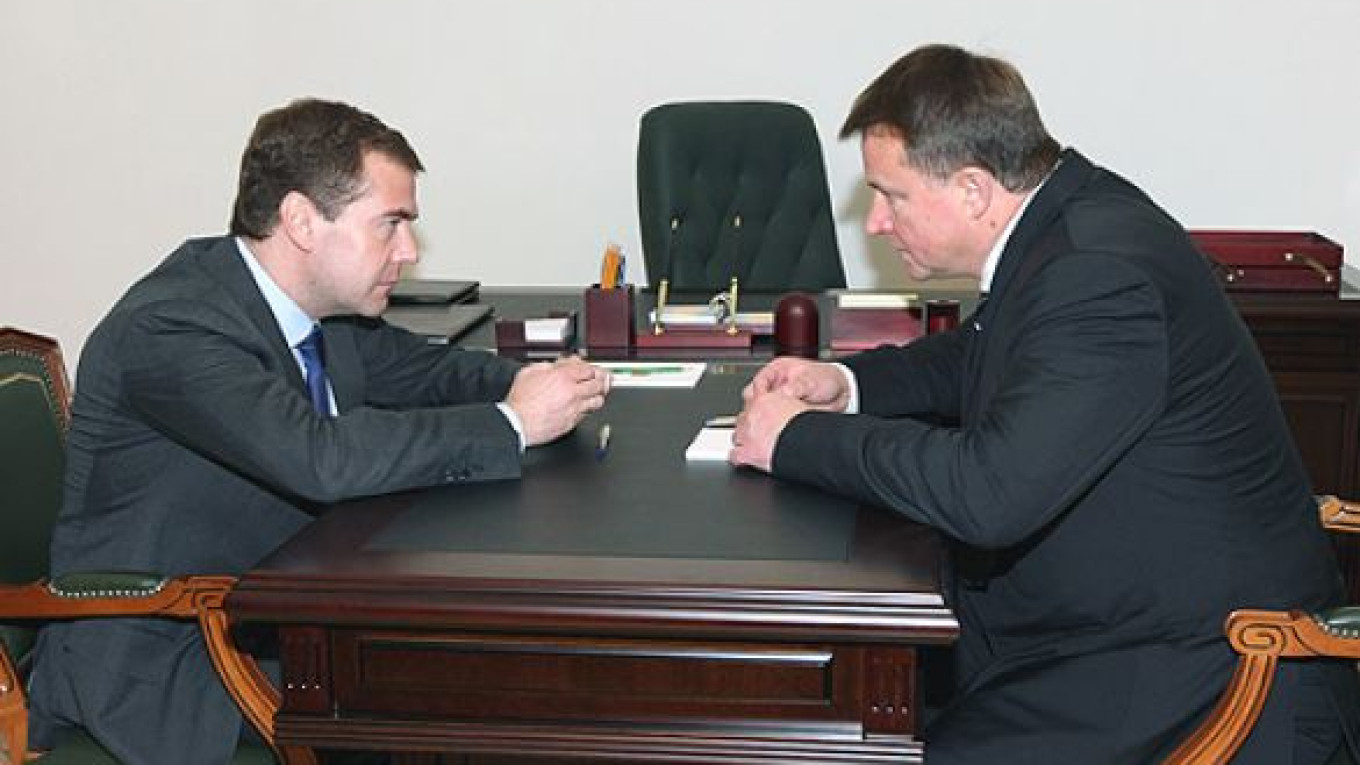Former Tula Governor Vyacheslav Dudka will spend nearly 9 1/2 years in a high-security prison in what marks the first time a former governor has received such a harsh sentence in modern Russia.
Dudka was sentenced by a local court Monday for accepting 40 million rubles ($1.3 million) in return for allocating a plot of land to a hypermarket chain.
He will also have to pay a fine of 900,000 rubles ($27,800).
Governors have regularly been accused of? corruption in? the past, but the? allegations have rarely led to? criminal convictions, prompting speculation about why Dudka's sentence was so harsh.
Dudka has denied all charges against him, saying that the case was politically driven by his former colleague Viktor Volkov, who acted as a mediator in passing the bribe from the Grinn hypermarket chain, one of the biggest in Central Russia.
Volkov himself was sentenced to 2 1/2 years in prison but was set free in the courtroom since he had already served his term while under house arrest.
Dudka's lawyer, Vladimir Zherebenkov, told Interfax he was "shocked" by the decision and promised that the defense would file an appeal.
In accordance with the Criminal Code, Dudka could have been sentenced to a more lenient term, as the article calls for anywhere from five to 10 years behind bars.
The only other instances of governors being sentenced so harshly were in 1999, when Vologda region Governor Nikolai Podgornov was sentenced to seven years in jail. He was pardoned in 2000, however. Several governors were sentenced to lesser terms in the 2000s, but they were always quickly released on parole or pardoned.
Local journalist Andrei Mazov called Dudka's sentence an "epochal event for the region" in his blog on Echo Moskvy radio's website.
According to Mikhail Vinogradov, a political analyst with the St. Petersburg Politics Fund, the sentence appears to signify a desire by Russia's security services to prove their importance and show that high-ranking officials must compromise and be loyal.
"After Navalny's release on Friday, the Investigative Committee had to show that it is still strong and powerful," he said, referring to another unprecedented situation, in which opposition leader Alexei Navalny was freed by a Kirov court following a massive protest against his arrest in Moscow.
Dudka, 53, was appointed governor in 2005 by President Vladimir Putin and reappointed by then-President Dmitry Medvedev in 2010.
After numerous corruption scandals, he resigned in July 2011 and was later expelled by the ruling United Russia party after demanding severance pay from the state, a move which the party said had "discredited" its image.
Criminal charges in the case were filed against him in September 2011. At that time, many analysts suggested that he was a scapegoat in a political crisis that had been simmering in the region, citing the dismissal of Mayor Alisa Tolkachyova by the United Russia-controlled city legislature as evidence.
Alexei Titkov, an? analyst with the? Institute for? Regional Politics, said at that time that Dudka might have fallen victim to? a government effort to? show that it was fighting corruption.
Dudka was not in custody for the duration of court proceedings as investigators took into account his good record in state service and his willingness to cooperate during the inquiry.
If his appeal is rejected, he will have to spend his term in a high-security prison with inmates who have committed grave crimes. Prisoners are not allowed to move around the premises without being supervised.
Dudka was one of the first heads of regions to be appointed after Putin abolished direct elections for governors in 2004. Medvedev rolled back that reform, albeit with certain limitations, such as the requirement for governors to collect signatures from municipal deputies in order to be registered.
In recent years, experts have criticized governors' dependence on the federal government, saying it undermines federalism in Russia.
Contact the author at [email protected]
Related articles:
A Message from The Moscow Times:
Dear readers,
We are facing unprecedented challenges. Russia's Prosecutor General's Office has designated The Moscow Times as an "undesirable" organization, criminalizing our work and putting our staff at risk of prosecution. This follows our earlier unjust labeling as a "foreign agent."
These actions are direct attempts to silence independent journalism in Russia. The authorities claim our work "discredits the decisions of the Russian leadership." We see things differently: we strive to provide accurate, unbiased reporting on Russia.
We, the journalists of The Moscow Times, refuse to be silenced. But to continue our work, we need your help.
Your support, no matter how small, makes a world of difference. If you can, please support us monthly starting from just $2. It's quick to set up, and every contribution makes a significant impact.
By supporting The Moscow Times, you're defending open, independent journalism in the face of repression. Thank you for standing with us.
Remind me later.


